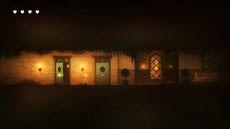GDC Hands-on – Outer Wilds
Outer Wilds is a very enjoyable way to die. It places players in a strangely forgiving world, and then asks almost nothing of them save that they explore and learn about the solar system.
I had the good fortune of getting to talk to some of the team behind this new exploration game, by which I mean we all stared at each other awkwardly until someone eventually offered to let me play the game. What can I say. I have a way with people. Soon enough, I was a weird little alien chap, being told that it was almost time for another launch, which maybe wouldn’t kill me, probably, provided someone had fixed those attitude thrusters. To kill time, it was suggested that I go see some folks about last minute astronaut training, and then get the launch codes. First up though: zero-gravity training.
For some reason, the aliens have managed to find a cave that lacks gravity. Moving about in zero-gravity is pretty standard for any gamer (especially if they’ve been playing, say, Space Engineers too often), and Outer Wilds didn’t try for anything crazy in this regard, but even with previous experience, it takes some getting used to. Once I had that mastered, I headed over to the miniature, remote-controlled spaceship to learn how to fly. I sucked at that, but after successfully landing once or twice on a stump, and only blowing up half a dozen times, I headed up to the observatory to get the launch codes.
And there is where things got weird. I met some fellow aliens in the observatory, toured the space museum they had, which included a Weeping Angel-esque stone that teleported whenever I looked away from it, a gravitational anomaly that let me walk onto the wall, and, naturally, a map of the solar system. Alongside that last was where I found the alien who gave me the launch codes I needed, and, thinking I had seen all I needed to see in the observatory, headed for the exit. Naturally, an ancient alien artifact on display turned of its own accord and shot a bunch of symbols into my brain. You know, like all stone heads do.
Once the lifeless artifact was done accosting my brain, I wentt down to the launch pad to get this interplanetary show on the stellar road. Naturally, I died pretty quickly.
On my first flight, I turned on the autopilot to go to one scary, thorny “planet,” and promptly flew into the sun. Luckily, the way Outer Wilds deals with death is to have the alien artifact rewind you back to just before you launched, and then set you free to roam again, now knowing such important information as: “Flying into the sun is generally a bad idea.” On my second flight, I flew mostly manually to my original target, a collection of mists and giant thorns that could only be called a planet by a fantasy writer. This time, I was much more successful, insofar as I did not turn my ship and fly into star fuel. I did, however, almost get eaten by a stellar angler fish, which I knew to be a possibility, but I had decided to risk it anyways. Luckily, I avoided being eaten, but I did have to hop out of my ship to repair it enough to fly away.
Finally, after leaving this brambly world, I headed for a strange pair of worlds that appeared to exist solely to dump sand on each other. Enormous, terrifying funnels of sand would pour from one planet to another, and I could not discern their purpose or an explanation, either on foot or in my ship.
And it was here that I took the headphones off and handed them back to the dev team, because it was at that point that I knew I could lose many, many hours to exploring the solar system that was Outer Wilds. It also gave me a lot of insight into why it and its team won the grand prize at the 2015 Independent Games Festival.
Outer Wilds is an indie game simply about exploring a strange, strange solar system, and parallels our own in that we really don’t know everything about the planets that surround us. We know enough to know none of them are pouring sand on one another (probably), but not nearly enough to say much beyond their observable, physical properties. And people really, really want to know what is on any and all of these planets.
You can learn more about Outer Wilds and its team from their website. The game is currently in an Alpha state, and as such is not available to buy yet, but you can download the Alpha for Mac, Linux, or Windows PCs here. Let us know whether your journey into the Outer Wilds goes any better in the comments below!





